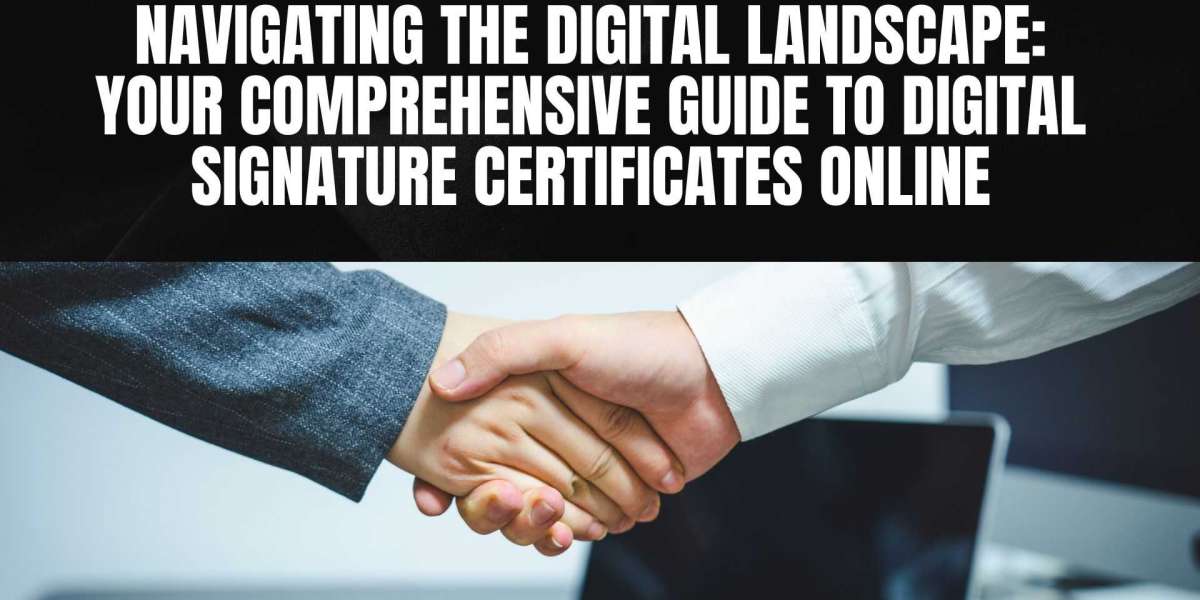In today's digital age, where transactions, communications, and interactions take place predominantly in the virtual realm, ensuring the security of our online activities is paramount. From personal emails to sensitive financial transactions, the need for robust digital security measures has never been more critical. One such crucial aspect of digital security is the use of Digital Signature Certificates (DSCs). In this comprehensive guide, we delve into the world of DSCs, exploring what they are, how they work, and why they are essential for safeguarding your online presence.
Understanding Digital Signature Certificates (DSCs)
A Digital Signature Certificate (DSC) is a digital equivalent of a physical or paper certificate. It serves as a digital identity proof, validating the authenticity of the sender or signee of an electronic document or transaction. Essentially, a DSC provides assurance regarding the identity of the signer and ensures the integrity and non-repudiation of the signed document.
How Do Digital Signature Certificates Work?
Digital Signature Certificates operate on the principle of public-key cryptography. Each DSC consists of a public key and a corresponding private key. The public key is freely available and is used to verify the digital signatures generated by the private key. Conversely, the private key is securely held by the owner and is used to create digital signatures.
When a document is signed using a DSC, the signer's private key generates a unique digital signature for that document. This signature is then attached to the document, along with the signer's public key. Recipients can verify the signature using the signer's public key, ensuring that the document has not been tampered with and was indeed signed by the purported signer.
Types of Digital Signature Certificates
There are primarily three types of Digital Signature Certificates:
Class 1 DSC:
These certificates are issued for individuals or private individuals to confirm that the user's name and email contact details from the clearly specified subject lie within the database of the Certifying Authority.
Class 2 DSC:
This type of certificate is used for company directors or authorized signatories to authenticate the name and basic contact information, providing a higher level of assurance compared to Class 1 DSCs.
Class 3 DSC:
The highest level of assurance is provided by Class 3 DSCs. These are used in applications where security and trust are paramount, such as e-commerce, e-procurement, and e-bidding.
Applications and Benefits of Digital Signature Certificates
Digital Signature Certificates find applications in a wide range of fields, including:
E-Governance:
DSCs facilitate secure online transactions with government agencies, such as filing tax returns, applying for permits, or participating in e-tendering processes.
Banking and Financial Services:
DSCs enable secure online banking transactions, loan applications, and electronic fund transfers, ensuring confidentiality and integrity.
Legal and Regulatory Compliance:
Many legal and regulatory frameworks mandate the use of DSCs for signing electronic documents, contracts, and filings, ensuring compliance and legal validity.
Business Transactions:
DSCs streamline business operations by facilitating secure document signing, contract negotiations, and electronic communications, minimizing the risk of fraud and unauthorized access.
Obtaining a Digital Signature Certificate Online
Obtaining a Digital Signature Certificate involves the following steps:
Choose a Certifying Authority:
Select a trusted Certifying Authority (CA) accredited by the Controller of Certifying Authorities (CCA) in your jurisdiction.
Submit Application and Documentation:
Provide the required documentation, such as proof of identity, address, and organization details, as per the CA's requirements.
Identity Verification:
Undergo identity verification processes, which may include in-person verification or submission of notarized documents.
Key Generation and Issuance:
Upon successful verification, the CA generates the public-private key pair and issues the Digital Signature Certificate to the applicant.
Best Practices for Digital Signature Certificate Usage
To maximize the effectiveness of Digital Signature Certificates and ensure optimal security, users should adhere to the following best practices:
Protect Private Key:
Safeguard the private key associated with your DSC by storing it securely in encrypted form and avoiding sharing it with unauthorized parties.
Use Strong Passwords:
Set strong, unique passwords for accessing and using your DSC, and change them regularly to mitigate the risk of unauthorized access.
Monitor Certificate Expiry:
Keep track of the expiry date of your DSC and renew it well in advance to prevent disruptions to your digital transactions.
Verify Signatures:
Always verify the digital signatures of electronic documents using trusted verification tools or software to confirm their authenticity and integrity.
Stay Informed:
Stay abreast of the latest developments and advancements in digital security practices and technologies to adapt and enhance your security posture accordingly.
Suggested Read: Digital Signature Certificate for E-Ticketing
Conclusion
Digital Signature Certificates play a pivotal role in ensuring the security, integrity, and authenticity of electronic transactions and communications in today's digital landscape. By understanding how DSCs work, their applications, and best practices for their usage, individuals and organizations can leverage these powerful tools to protect their online assets, mitigate risks, and foster trust and confidence in their digital interactions. Embracing DSCs is not just a matter of compliance; it's a proactive step towards enhancing digital security and resilience in an increasingly interconnected world.



